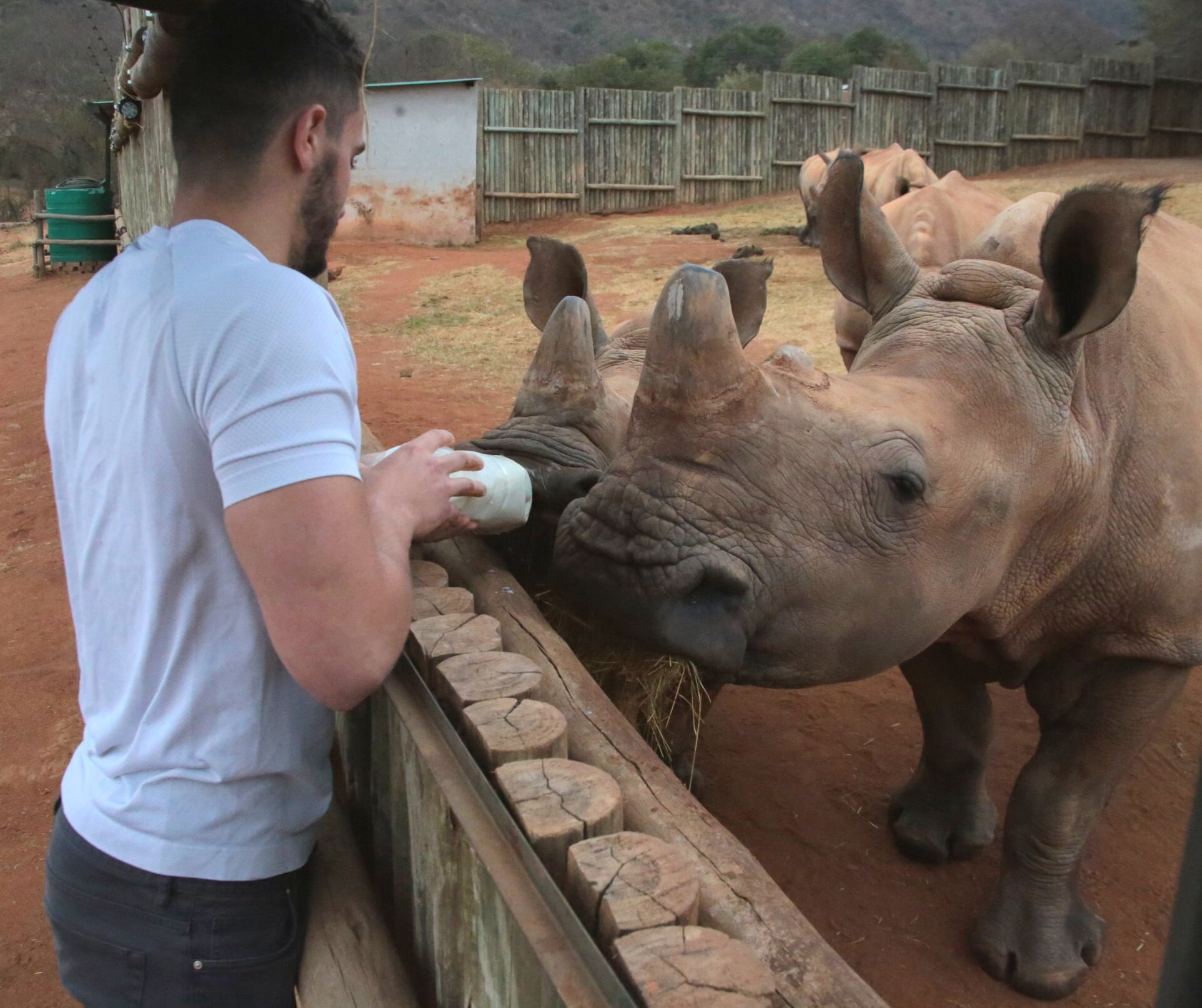MEET OUR INTERN MATT LOBENHOFER
Matt Lobenhofer is our US-based Wild Tomorrow Fund intern and has been a dedicated & inspiring addition to our team since he joined us virtually this Summer. After graduating in 2019 with his degree in Conservation Biology from The State University of New York (SUNY) College of Environmental Science and Forestry, Matt has worked on scarlet macaw conservation, reforestation and re-wilding in Costa Rica, travelled to Ecuador to learn about forest ecology in the Amazon, and helped out at a rhino orphanage in South Africa.
Learn more about why he is so passionate about wildlife conservation in this Q&A style interview with Matt.
Matt in front of a ceiba tree in the Amazon, Ecuador
Why did you decide to pursue a career in wildlife conservation?
Growing up I always had a passion for nature despite being raised in the concrete jungle of New York City. I learned of the threats our natural world is facing and have been fiercely passionate since. As I’ve grown, so has my passion, and my exposure to these issues first hand has transformed my passion from something I wanted to do into something that I need to do.
Tell us about your studies and experiences in wildlife conservation so far
A pair of scarlet macaws.Photo credit: Ben Cherry/Wildscreen Exchange
Throughout high school I was able to volunteer for an exotic animals vet and for a pet store focused on responsible pet care and conservation. In each, I was fortunate enough to get experience in animal care and behavior, medical practices and procedures, and handling methods for various species of animals. After high school, I went to the College of Environmental Science and Forestry, or SUNY ESF, majoring in Conservation Biology. During one summer, I was a research assistant at Macaw Conservation Costa Rica, working to breed and release scarlet macaws, while reforesting land to provide usable habitat for them. I did a study on a nearby river while there, working with the government conservation group and the local farmers to measure the impact of rice farms on the river’s surrounding biodiversity, following up the study with a conservation management plan for reforesting and rewilding, as well as for providing alternative sustainable farming methods and employment opportunities for the rice farmers.
My senior year, I took a tropical ecology course that brought me to Ecuador for two weeks, where I got to survey at a biological station in the Amazon and explore the Andes Mountains. After I graduated, I went to South Africa with a conservationist friend to deliver a piece of equipment to the Care for Wild rhino sanctuary, and used the remaining ten days there to adventure around the country and experience as much of its natural beauty as possible. I’m hoping to continue my education with a master’s degree and an eventual PhD in a related field.
Feeding an orphaned rhino at Care for Wild Rhino Sanctuary in South Africa.
What attracted you to Wild Tomorrow Fund and our work?
Initially, pairing habitat restoration and species conservation was familiar to me and it was something I loved doing so that caught my eye. Looking into it further, I found it was in one of the areas in South Africa I was fortunate enough to have visited and I learned of its significance in biodiversity. To top it all off, the fact that Wild Tomorrow Fund not only does its own conservation work, protecting wildlife and habitat, but also gives support to other conservation organizations shows how selfless and genuine their mission is. I was sold pretty much immediately.
What is your dream job in conservation?
I love surveying. Going out into the field and finding as many species as possible and recording their behaviors, their habitat, and anything I can use to improve their situation is something I’ll never get tired of. I think facilitating and monitoring the rewilding of an area is something I’d be most passionate about right now.
Do you have a particular species you love or are intrigued by the most (I know, we're not meant to have favorites but...)
I started my career focusing on reptiles, which slowly transitioned to birds, which slowly transitioned to me being indecisive. I can’t choose any one species or group of species but the biodiversity of tropical rainforests and its balanced and specific interactions was what intrigued me the most for a long time. Even that I’m no longer certain about after getting to experience Africa and being able to help out Wild Tomorrow Fund. I’m a big fan of snow leopards too but that just complicates this answer further.
What makes you optimistic for the planet and its future?
The condition of our planet has become hard to ignore. It’s right in front of our faces and people are taking notice. There is a response that’s growing and it’s getting louder. People are making changes in their day to day lives, being more conscientious. As the size of the population concerned for our environment’s health grows, so does the pressure for change. Companies are improving practices and are working to develop solutions, giving people sustainable alternatives to companies that won’t do the same.
Education is key to amplifying this response, making people care, and organizations like Wild Tomorrow Fund give those people hope. I stay optimistic because I’ve seen the awe and passion that come with experiencing true nature, and I’ve seen the dedication of organizations like Wild Tomorrow Fund. There is so much work to be done and so much change that needs to be made, but I feel as though the inspiration nature provides can allow us as a whole to accomplish great things.
“We have the choice to use the gift of our life to make the world a better place--or not to bother”
― Jane Goodall




